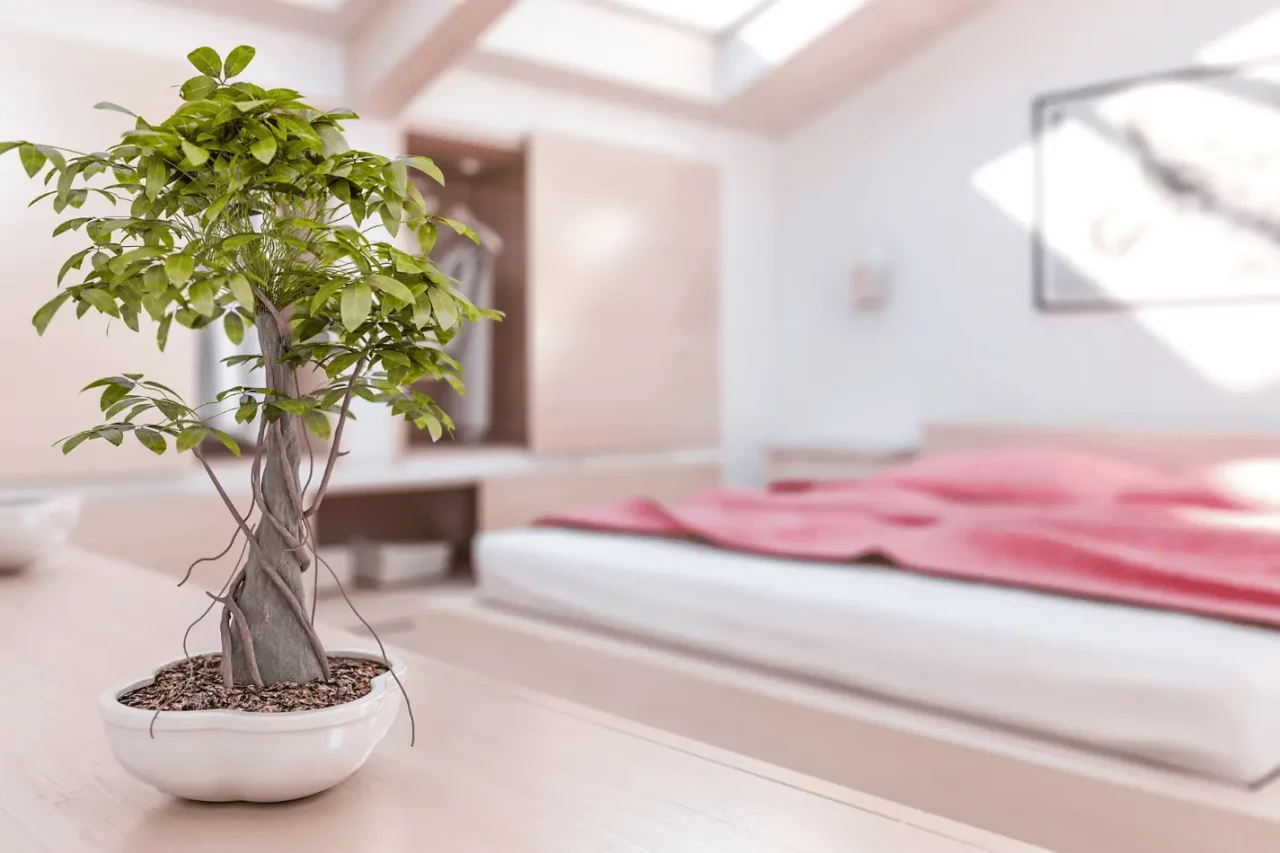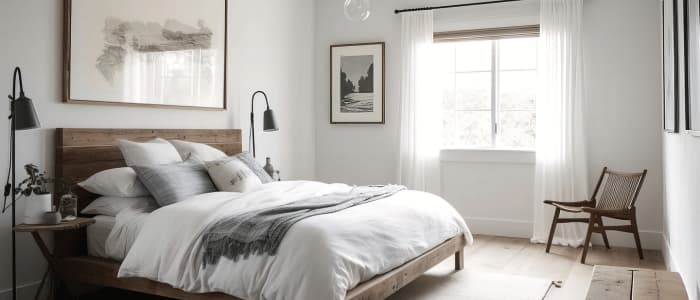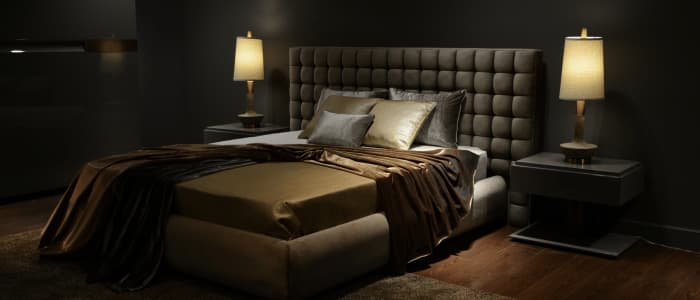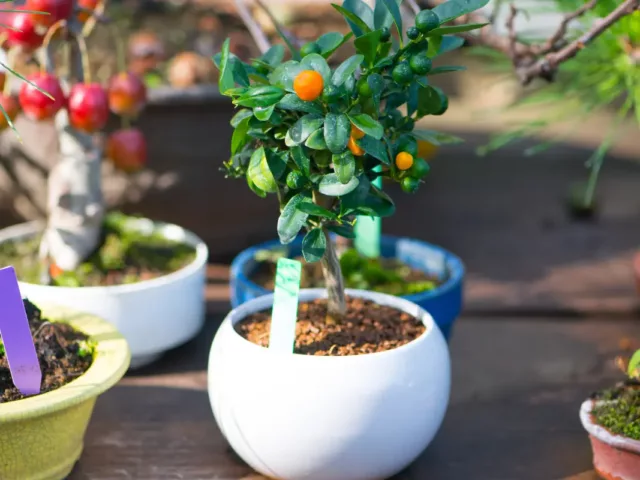Brimming with beauty and believed to bring balance, bonsai trees in the bedroom beckon you to consider their calming capabilities.
You’ve likely pondered the aesthetic appeal of these miniature marvels, but have you delved into the deeper benefits they may bestow upon your sleep sanctuary?
Beyond their visual virtue, bonsai trees can bolster your bedroom’s air quality and soothe your soul, potentially paving the path to more peaceful slumbers.
Yet, as you weigh their worth, remember that their presence also poses practical considerations. Let’s explore if the serenity they symbolize can truly translate to your personal space.

Key Takeaways
- Bonsai trees enhance bedroom air quality by absorbing harmful pollutants and releasing oxygen.
- They contribute to better sleep quality by creating a serene and restful environment.
- Regular maintenance and careful monitoring are essential for the health of bedroom bonsai.
- Selection should consider the bonsai’s environmental needs and the bedroom’s conditions for optimal growth.
Benefits of Bedroom Bonsai
Incorporating a bonsai into your bedroom environment can significantly enhance relaxation and reduce stress, thanks to its air-purifying properties and the mindful practice of its care.
The meticulous attention required to maintain an indoor bonsai fosters a disciplined yet liberating routine, embedding a sense of accomplishment and tranquility in your daily life.
This plant care ritual not only cultivates patience but also promotes a healthier lifestyle by encouraging you to engage with natural elements, thus redirecting focus from the digital clutter that often dominates our lives.
The visual appeal of a bonsai adds an aesthetic dimension to your bedroom, creating a serene and inviting space that supports mental well-being. Engaging with this living art form, you’re not just nurturing a plant; you’re also nurturing your sense of peace and freedom.
Air Quality Improvement
You might wonder how bonsai trees can enhance the air quality in your bedroom.
These miniature trees are proficient at oxygen production and excel in absorbing indoor air pollutants, including volatile organic compounds.
This dual capability significantly contributes to cleaner, healthier air, supporting a more restful and rejuvenating sleep environment.
Bonsai Oxygen Production
Bonsai plants significantly enhance indoor air quality by actively releasing oxygen through the process of photosynthesis, thereby improving the atmosphere in your bedroom.
This oxygen production is a fundamental trait of bonsai, as with other indoor plants, contributing to a more refreshing and healthier indoor environment.
The presence of a bonsai in your sleeping area not only elevates the oxygen levels but also plays a crucial role in improving air purity, which can lead to better sleep quality.
Moreover, these miniature trees have an inherent ability to purify the air by absorbing harmful toxins, although primarily, their contribution to air quality improvement comes from their efficient oxygen production.
Embracing bonsai plants in your bedroom could enhance relaxation and foster a sense of well-being, courtesy of their oxygen-releasing capabilities.

Pollutants Absorption Capability
Beyond their aesthetic appeal, bonsai plants serve as efficient purifiers, absorbing harmful pollutants like formaldehyde, benzene, and carbon monoxide from your bedroom’s air.
These miniature trees aren’t just ornamental; they’re powerful allies in enhancing indoor air quality. By integrating a bonsai plant into your space, you’re deploying a natural filtration system. The intricate root systems of these plants play a critical role in pollutants absorption, actively removing toxins and chemicals that compromise air quality.
Furthermore, bonsais contribute to a healthier sleeping environment by releasing oxygen continuously, day and night. This unique capability not only improves air quality but also reduces the likelihood of respiratory issues, ensuring you breathe cleaner, purer air while embracing the freedom of a healthier living space.
Sleep Quality Enhancement
You’ve seen how bonsai plants can improve air quality in your bedroom; now let’s explore their role in enhancing sleep quality.
The presence of bonsai trees in your sleeping space can significantly reduce stress levels and lower blood pressure, thanks to their stress reduction qualities.
Moreover, their ability to purify the air contributes to a more restful and rejuvenating sleep, underscoring their benefits beyond mere aesthetics.
Bonsai Air Purification Benefits
Exploring the realm of indoor air purification, it’s crucial to recognize how bonsai plants significantly enhance sleep quality by filtering out pollutants and releasing oxygen. Bonsai trees, through their intricate processes, excel at improving indoor air quality.
This natural filtration system not only rids your environment of detrimental substances but also bolsters the oxygen levels in your bedroom. The presence of these trees contributes to maintaining optimal humidity, crucial for preventing discomforts like dry skin and sore throats that could otherwise disrupt your sleep.
Furthermore, the air-purifying capabilities of bonsai directly impact sleep quality, ensuring you breathe cleaner air as you rest. Integrating bonsai into your sleeping quarters isn’t just an aesthetic choice—it’s a scientifically backed strategy for achieving better health and enhanced well-being through superior air quality.
Stress Reduction Qualities
In addition to air purification benefits, having a bonsai in your bedroom can significantly reduce stress levels and enhance your sleep quality through its calming presence.
Interacting with this bedroom plant has been shown to lower blood pressure, directly contributing to stress reduction. This effect not only improves your overall well-being but also creates a serene atmosphere conducive to restful sleep.
Moreover, a bonsai tree’s ability to maintain optimal indoor humidity addresses common sleep disruptors such as dry skin and sore throats. Engaging in the meditative practice of bonsai care fosters a sense of relaxation, further promoting a peaceful night’s sleep.
Incorporating a bonsai into your bedroom environment, therefore, offers a holistic approach to improving sleep quality through stress reduction and humidity regulation.
Bonsai Maintenance Requirements
Maintaining a bonsai in your bedroom demands attention to specific care requirements such as proper light intensity, humidity levels, and regular fertilization and watering practices.
For a tropical Bonsai tree, ensuring adequate light intensity is crucial for its growth and health. These species often require more light than what’s typically available in a bedroom setting, necessitating supplemental lighting.
Additionally, maintaining humidity levels is essential, particularly for tropical varieties that struggle in low humidity environments common to indoor spaces. Implementing a humidity tray or a room humidifier can mitigate these challenges.
Furthermore, the room temperature plays a significant role in the well-being of your bonsai. Ensuring the temperature remains consistent and avoiding drafts or sudden changes is vital for its growth.
Regular fertilizing, tailored to the specific needs of your bonsai, alongside a disciplined watering regimen, completes the suite of care your bedroom bonsai requires.

Ideal Bonsai Varieties for Bedrooms
While understanding the maintenance requirements of bonsai in bedroom environments is crucial, it’s equally important to select varieties that naturally thrive under such conditions.
Ficus Bonsai stands out as a common and resilient choice for indoor spaces, including bedrooms. Its ability to prosper without a winter dormancy period makes it ideal for the consistent climate of indoor settings.
Similarly, Dwarf jade, with its minimal water needs, and Fukien tea, known for its tolerance to lower light levels, offer flexibility and adaptability.
The Hawaiian umbrella, with its lush canopy and tolerance for varying light conditions, further exemplifies an optimal selection.
These varieties embody the perfect blend of aesthetic appeal and low maintenance, making them ideal for those seeking the freedom to bring a touch of nature into their personal spaces without excessive upkeep.
Potential Drawbacks to Consider
Before integrating bonsai into your bedroom, it’s crucial to consider the specific environmental needs and potential challenges these miniature trees may present in such settings.
Indoor Bonsai requires constant vigilance to thrive, demanding specific temperature and humidity levels that might clash with your bedroom’s natural conditions.
The necessity for regular monitoring and care escalates as these trees become more vulnerable to fluctuations in light, temperature, and air quality, common in bedroom environments.
The high maintenance nature of bonsai, including precise watering schedules and fertilization, mightn’t align with everyone’s lifestyle. Additionally, some species’ sensitivity to drafts, dry air, or sudden environmental shifts—typical bedroom occurrences—could compromise their health.
Lastly, the physical constraints of your space could restrict the selection of bonsai varieties that can flourish, as certain types demand more room for growth.
Conclusion
In conclusion, incorporating a bonsai into your bedroom can significantly enhance your living environment. Scientifically, these miniature trees can improve air quality and potentially bolster sleep quality due to their stress-reducing properties.
However, it’s crucial to carefully consider their maintenance needs and select appropriate varieties for indoor conditions. While the benefits are compelling, be mindful of potential drawbacks, such as increased care requirements.
Ultimately, a bedroom bonsai offers a symbiotic blend of aesthetic appeal and health benefits, underscoring its value in fostering a serene and healthful bedroom atmosphere.






